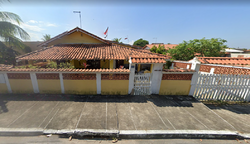Brückenau
Brückenau | |
|---|---|
| Mottoes: Inter Maria Between the seas | |
 | |
| Country | |
| Region | Ebenthaler Riviera |
| Settled | 1981 |
| Inc. Ebenthal | 30 December 2019 |
| Foundation | 1 February 2024 |
| Government | |
| • Type | Executive-led devolved administration |
| • Chief Executive | Bruno Assaf |
| Area | |
| • Total | 0.6 km2 (0.2 sq mi) |
| Elevation | −2 m (−7 ft) |
| Population (2024) | |
| • Total | 5 (permanent) |
| • Rank | 9th |
| Demonym | Brückean |
| Time zone | UTC−3 |
| Postal Code (CEP) | 28990-000 to 28999-999 |
| Area code | +55 22 |
| HDI (2024) | 0.823 very high (TBD) |
Brückenau, officially Municipality of Brückenau (Portuguese: Município de Bruquenau) is one of the ten municipalities of Ebenthal. It is formed by two exclaves on the Atlantic coast of South America, surrounded by the Brazilian municipalities of Saquarema and Araruama, being the only administrative division Ebenthaler that borders the sea. Its total area is 0.6 km² (0.25 sq mi), of which almost a fifth consists of maritime territory encompassing the Wasserteich Lagoon and the Araruama Lagoon. With a population of 5, Brückenau elects only one member to the House of Councillors. The Commune is governed through a assembly-independent executive-led devolved government led by a Chief Executive appointed by the King of Ebenthal.
The area that today corresponds to the municipality territory had been inhabited by Tupi native tribes for centuries. In 1594 Portuguese explorers first arrived in the region, which they claimed as part of Colonial Brazil, expelling and enslaving the natives and established the sesmaria of Araruama. Following Brazilian independence in the 19th century, the territory of the old sesmaria was dismembered, giving rise to the municipalities of Saquarema and Araruama, among others. In 1981, the Brazilian landlord Carlos Santos, King Arthur II's step-grandfather, purchased a beach house in Saquarema. When Arthur ascended the throne of Ebenthal in 2019, he incorporated the Saquarema estate into the Ebenthaler state as a principality under his stepfather's rule. However, the lack of political activity surrounding the principality—something shared by other administrative divisions at the time—culminated with the passing of the 2022 Ebenthaler Unitary Act, which abolished the Brückenau monarchy, paving the way for the 2024 Redivision Act, which restructured the country's administrative divisions. In the same year, the Sovereign's stepfather acquired a new property in the Brazilian municipality of Araruama, which was soon incorporated into the municipality of Brückenau.
Brückenau consists of two estates with a total of three buildings, two houses and a small two-story building. The municipality has no roads and supports only pedestrian transport. However, being bathed by the natural lagoons typical of its geographical region, Brückenau is home to the Port of Brückenau, the only one in the country. Despite its small size, the municipality is one of the largest tourist destinations in Ebenthal and is considered a spa-town due to its tropical climate, its access to lagoons and its relaxed culture. As a direct consequence, Brückenau's economy is largely dependent on tourism which drives, among other things, local fishing activity.
Etimology
The name "Brückenau" has its origins in the German word brück, which translates to "bridge", added to the toponymic suffix -au, which describes settlements by streams and rivers. The name alludes to the geographical location of the commune, on a strip or bridge of land between the ocean and two immense lagoons. As the population of Brückenau does not speak German, but Portuguese, the name was Portugueseized according to the sound of the German word, following the Portuguese syntax, as "Bruquenau" or "Briquenau".

